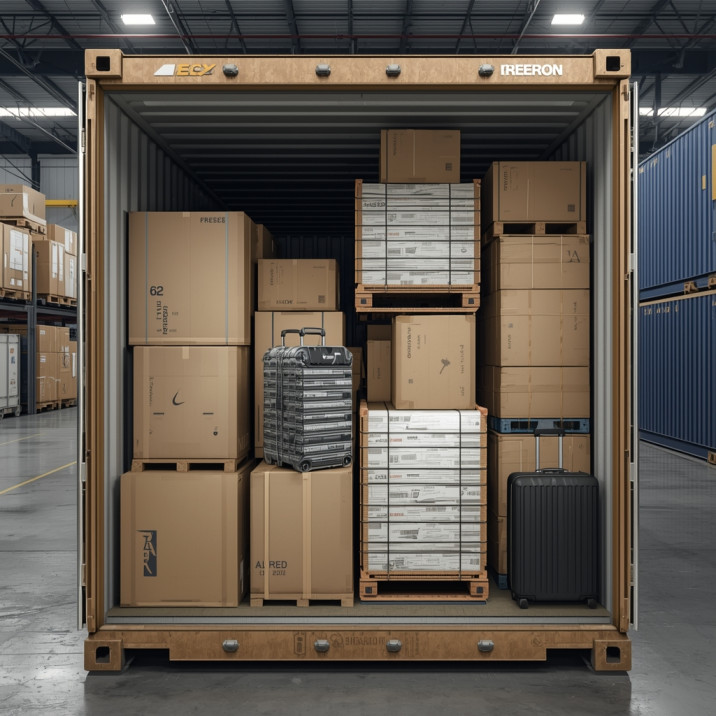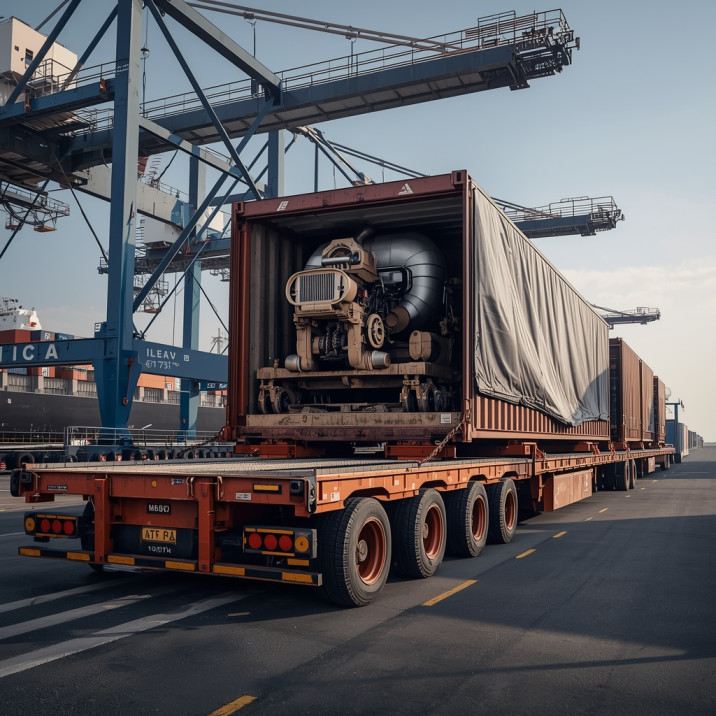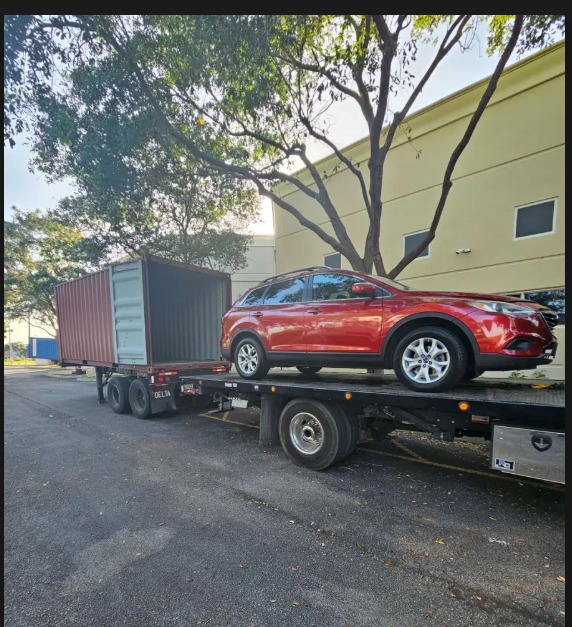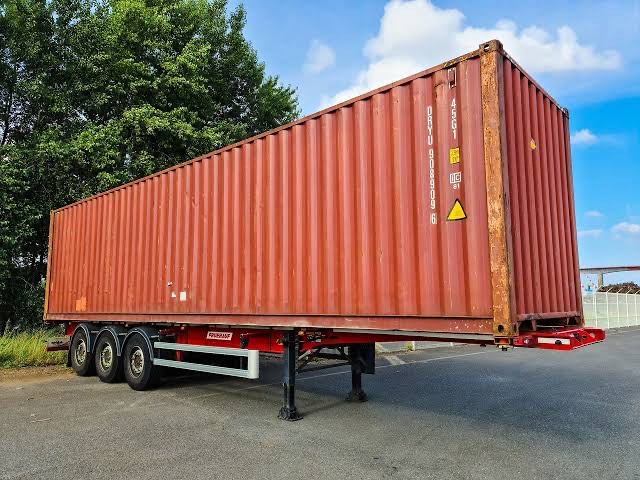Container shipping to Abu Dhabi is a reliable and cost-effective solution for transporting vehicles, household goods, heavy machinery, and commercial cargo overseas. Whether you need to ship a container to Abu Dhabi for personal relocation or business purposes, international container shipping offers secure handling and flexible options, including 20ft, 40ft, open top, and flat rack containers—making it suitable for almost all cargo types.
At All Transport Depot, we provide professional container shipping to Abu Dhabi with complete end-to-end logistics support. The cost of container shipping to Abu Dhabi typically ranges from $2,200–$3,800 for a 20ft container and $4,200–$6,800 for a 40ft container, depending on the origin port, cargo type, and shipping method. With transparent pricing and expert coordination, we ensure your shipment arrives safely and on time.
Table of Contents
Container Sizes Available for Shipping
When planning container shipping, selecting the right container size is essential for ensuring cargo safety, cost efficiency, and smooth transit. Different container sizes are designed to accommodate everything from personal belongings and vehicles to heavy machinery and oversized cargo. Below are the most commonly used container options available for shipping to destination country.
20ft Shipping Container
The 20ft container is one of the most popular choices for international container shipping to XXX. It is ideal for small to medium-sized shipments and offers a cost-effective solution for transporting cargo securely.
Best suited for:
- One vehicle or SUV
- Household goods and personal effects
- Small commercial shipments
40ft Shipping Container
A 40ft container provides nearly double the space of a 20ft container, making it suitable for large shipments or multiple items. It is commonly used for business cargo, relocation shipments, and multiple vehicles.
Best suited for:
- Multiple vehicles
- Large household relocations
- Bulk commercial cargo
Open Top Container
Open top containers are designed for cargo that cannot be loaded through standard container doors due to height or shape. Cargo is loaded from the top using cranes and secured properly for ocean transport.
Best suited for:
- Tall or oversized machinery
- Construction equipment
- Industrial cargo
Flat Rack Container
Flat rack containers are used for heavy, wide, or irregularly shaped cargo that does not fit inside standard containers. These containers have open sides and are specially designed for oversized and heavy loads.
Best suited for:
- Heavy machinery
- Construction and mining equipment
- Large industrial components
What Can Be Shipped in a Container
Container shipping allows a wide range of cargo types to be transported safely and efficiently. Whether you are shipping personal belongings or commercial freight, containers provide secure, weather-protected space suitable for almost all types of goods. Below are the most common items shipped in containers.
Vehicles (Cars, SUVs & Motorcycles)Cars, SUVs, and motorcycles can be safely shipped in 20ft or 40ft containers, offering maximum protection during transit. Container shipping is especially preferred for luxury, classic, or non-running vehicles.
Household Goods & Personal EffectsContainer shipping is ideal for relocating household items such as furniture, appliances, electronics, and personal belongings. Both FCL and LCL shipping options are available depending on shipment size.
Commercial Cargo & General FreightBusinesses commonly use container shipping to XXX for transporting retail goods, inventory, raw materials, and packaged commercial products in bulk.
Heavy Machinery & Industrial EquipmentConstruction equipment, agricultural machinery, and industrial tools can be shipped using standard containers, open top containers, or flat rack containers, depending on size and weight.
Oversized & Project CargoLarge or irregularly shaped cargo that exceeds standard container dimensions can be shipped using flat rack or open top containers, ensuring secure handling for specialized shipments.
Safe & Secure Shipping for All Cargo TypesContainer shipping to XXX provides excellent protection against weather, handling damage, and theft, making it a reliable solution for both personal and commercial shipments.
Container Shipping Process (Step-by-Step)
Container shipping follows a simple and structured process to ensure safe and timely delivery.
Step 1: Request a shipping quote by sharing cargo details and destination.
Step 2: Book the container and confirm the sailing schedule.
Step 3: Load and secure cargo inside the container.
Step 4: Prepare documents and complete export clearance.
Step 5: Ocean freight transit to the destination country.
Step 6: Customs clearance at the destination port.
Step 7: Final delivery or port pickup.
Required Documents for Container Shipping
To ensure smooth and compliant container shipping, certain documents are required for export and import clearance. Having accurate paperwork helps avoid delays, penalties, and customs issues.
Commonly Required Documents
-
Bill of Lading (B/L) – Proof of shipment and ownership
-
Commercial Invoice – Details of cargo value and description
-
Packing List – Itemized list of goods inside the container
-
Passport or Company ID – For personal or commercial shipments
-
Import Permit (if required) – Based on cargo type and destination regulations
Additional documents may be needed depending on the nature of the cargo and local customs requirements in the destination country.
We operate and coordinate loading through strategically located U.S. facilities, providing flexible, reliable, and nationwide coverage for a wide range of cargo, including vehicles, household goods, commercial freight, and HAZMAT-compliant shipments.
Our primary loading locations include:
- Savannah, GA
- Atlanta, GA
- Los Angeles, CA
- Elizabeth, NJ
- Tacoma, WA
- Chicago, IL
In addition to facility-based loading, we also offer container door-to-ocean service, allowing a container to be delivered directly to a residence or commercial property for on-site loading, subject to access, safety, and scheduling requirements.
On-Site Container Loading Guidelines
We will deliver the ordered container to your location on the scheduled date and arrange return once loading is completed.
Important Loading Conditions
- The container will arrive on a chassis and will remain on the chassis at all times
- The container will not be placed on the ground
- The client is fully responsible for all loading activities
- Two (2) hours of free loading time are included
- Additional loading time: rate to be advised
- Weekend option: additional surcharge applies (Friday drop-off with Sunday pick-up after 5:00 PM)
- A 4-hour delivery window will be assigned, subject to traffic and scheduling conditions
- Vehicles or machinery require a proper loading ramp or dock
- Household goods may be lifted off the chassis only at the client’s cost and responsibility
- The client must ensure all required loading equipment is available, including but not limited to:
- Ramps
- Loading docks
- Forklifts
- Cranes or lifting services
- If the container is not ready for pickup on the scheduled date, a $250 per day delay surcharge will apply
- These guidelines ensure safe loading, operational efficiency, and compliance with carrier and port requirements.
Transit Time for Container Shipping to Abu Dhabi
The transit time for container shipping to Abu Dhabi typically ranges from 20 to 35 days, depending on the origin port, shipping route, and carrier schedule. Shipments from major U.S. ports usually arrive within 28–35 days, while shipments from Europe may arrive in 18–28 days under normal conditions.
Transit times may be affected by port congestion, weather conditions, customs inspections, and whether the shipment is FCL or LCL. Additional time should also be allowed for customs clearance and inland delivery after the container arrives in Abu Dhabi.
Cost to Ship a 20ft Container to Abu Dhabi
A 20ft container is ideal for smaller household moves, personal belongings, or a single vehicle. Prices vary by departure port and cargo type.
-
From U.S. East Coast (Newark, Savannah): $2,100 – $2,900
-
From U.S. West Coast (Los Angeles, Oakland): $2,400 – $3,400
-
From Europe: $1,800 – $2,700
Cost to Ship a 40ft Container to Abu Dhabi
A 40ft container is best suited for large household relocations, multiple vehicles, or commercial shipments. Rates vary by departure location.
-
From U.S. East Coast: $3,900 – $5,600
-
From U.S. West Coast: $4,300 – $6,800
-
From Europe: $3,200 – $4,800
Major Ports Used for Container Shipping to Abu Dhabi
Abu Dhabi has world-class port infrastructure supporting international container trade.
The major ports used for container shipping to Abu Dhabi include:
-
Khalifa Port – Abu Dhabi’s primary deep-water container port
-
Zayed Port – Handles mixed cargo and regional container shipments
Port selection depends on cargo type, shipping line, and final delivery requirements. Choosing the right Abu Dhabi port helps reduce transit time and ensure smooth customs clearance.
Import Duties and Taxes
Import costs in Abu Dhabi and the UAE depend on the cargo classification and declared value.
-
Customs Duty: Typically 5% on CIF value
-
VAT: Standard 5% on most imports
-
Additional Fees: Port handling, inspection, and documentation fees may apply
Using a licensed UAE customs broker is strongly recommended to ensure compliance with local regulations.
FAQs – Container Shipping to Abu Dhabi
Is container shipping to Abu Dhabi safe?
Yes, container shipping to Abu Dhabi is safe and secure. Containers are sealed, weather-resistant, and suitable for vehicles, household goods, machinery, and commercial cargo.
How much does it cost to ship a container to Abu Dhabi?
The cost generally ranges from $2,200–$3,800 for a 20ft container and $4,200–$6,800 for a 40ft container, depending on origin, cargo type, and shipping method.
Can I ship a car in a container to Abu Dhabi?
Yes, cars, SUVs, and luxury vehicles can be safely shipped in 20ft or 40ft containers for maximum protection during transit.
What is the cheapest way to ship cargo to Abu Dhabi?
For smaller shipments, LCL (Less than Container Load) is the most cost-effective option. FCL (Full Container Load) offers better value for larger shipments.
How long does container shipping to Abu Dhabi take?
Container shipping to Abu Dhabi typically takes 20 to 35 days, depending on the origin port, route, and customs clearance.
Do I need a customs broker in Abu Dhabi?
Yes, using a licensed customs broker in the UAE is highly recommended to ensure smooth clearance and avoid port delays.
✈️ Get a Container Shipping Quote Today
Ready to ship your Container? Here’s what we’ll need to get started:
📧 Email: ship@alltransportdepot.com
📲 WhatsApp: +1 (470) 791-4497
📞 Phone: +1 (678) 528-5794
At All TransportDepot Inc., we ensure premium service for safe, secure, and reliable car air shipping worldwide.
👉 Don’t wait—Get Your Free Quote Now

Kevin is a skilled auto mechanic specializing in vehicle inspections at Big Apple Auto Shippers. His thorough inspections guarantee that every car is in optimal condition before embarking on its journey. Kevin’s dedication ensures the reliability of every shipment.





